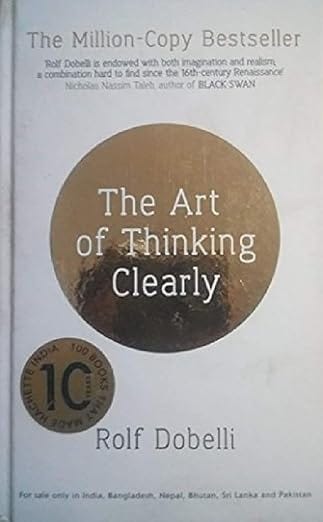This book will change the way you think about decision-making.
If you want to lead a happier, more prosperous life, you don't need shiny gadgets, complicated ideas or frantic activity.
You just need to make better choices.
From why you should not accept a free drink to why you should keep a diary, from dealing with a personal problem to negotiating at work, The Art of Thinking Clearly is a simple, straightforward and always surprising guide to a better, smarter you.
Making better choices will transform your life at work, at home, forever.
Here are some key lessons from The Art of Thinking Clearly by Rolf Dobelli:
Avoid Cognitive Biases: The book explains how various cognitive biases, like confirmation bias and anchoring, affect our decision-making. Being aware of these biases allows for clearer thinking and better decisions.
Don’t Rely on Intuition Alone: While intuition can be useful, it often leads to poor decisions. Dobelli suggests using logical reasoning and evidence-based thinking instead of simply going with your gut.
Be Skeptical of Experts: Experts often fall prey to biases too. The book encourages questioning expert opinions and making independent decisions based on available data and facts.
Think in Probabilities: Rather than viewing situations in terms of absolutes, consider probabilities. Thinking probabilistically helps you make more rational decisions, especially when outcomes are uncertain.
Learn from Mistakes: Failure is a natural part of decision-making. The book emphasizes learning from past mistakes and not letting them prevent future growth or lead to regret.
Avoid the Sunk Cost Fallacy: The sunk cost fallacy occurs when you continue an endeavor because of the time, money, or effort already invested. Instead, focus on future benefits and costs, not past investments.
Separate Emotion from Decision-Making: Emotional reactions often cloud judgment. Dobelli advises separating emotional responses from logical thinking to make better, more objective decisions.











